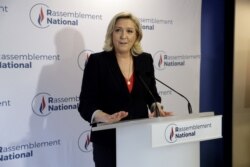The French far right party of Marine Le Pen failed to win any region while the centrist ruling party of President Emmanuel Macron suffered another poll drubbing in the second round of regional elections Sunday again marked by a woeful turnout, estimates said.
In a confirmation of trends set in the June 20 first round, Macron's ruling party did not break into double figures nationwide, according to the estimates by polling organizations broadcast by French television.
The National Rally (RN) of Le Pen failed to realize its main ambition of winning the Provence-Alpes-Cote d'Azur (PACA) region that includes Marseille and Nice, said the estimates by Ifop Fiducial for TF1/LCI and Ipsos/Sopra Steria for France Televisions. Victory there would have given them control of a region for the first time.
The outcome marks a boost for the traditional right-wing The Republicans as well as the Socialist Party, who were squeezed after the centrist Macron surged into power in 2017 with his brand-new Republic on the Move (LREM) party.
The first-round results led some observers to say it is far from a foregone conclusion that 2022 presidential election will come down to a duel between the two rivals.
Analysts warn against extrapolating too much from regional election results for the heads of France's 13 mainland regions, from Brittany in the northwest to the PACA region in the southeast.
But there was cross-party concern over the turnout for last week's polls, shunned by 66.72% of voters, a record in modern France.
The second round was set to mark barely any improvement, with more than 66% of the electorate not casting their votes, according to the estimate by Ifop Fiducial.
"I don't really know what the point is," said Helene Debotte, 31, who said she would not vote in these polls but would in the presidential elections. "There, it's clear what is at stake."
Polls have shown most French do not know who leads their regions and what the entities do.
No breakthrough
One of the most closely watched races on Sunday was whether the RN candidate Thierry Mariani could defeat his right-wing rival Renaud Muselier in the PACA region.
Gaining control of a region for the first time would have been a huge boost for Le Pen as she seeks to convince voters that the RN, which she has rebranded since taking over from her firebrand father Jean-Marie, is a serious party of power.
But the estimates showed that Muselier was on course to defeat Mariani by a margin of about 10%.
Muselier was helped by the withdrawal of left-wing candidates, an example of the "Republican Front" seen in past presidential elections to block the far-right.
Critics have accused Mariani of being an admirer of authoritarians such as Russian President Vladimir Putin and Syrian leader Bashar al-Assad. Prime Minister Jean Castex warned last week that a Mariani victory would be "very serious" for the country.
The RN also came up short in the Ile-de-France region that includes Paris. Its 25-year-old rising star Jordan Bardella failed to trouble right-wing incumbent Valerie Pecresse who is favored to hold off a coalition of the left and greens.
Right-wing heavyweight Xavier Bertrand meanwhile was set to hold on to the northeastern Hauts-de-France, estimates said, cementing his credibility as a 2022 presidential challenger from the traditional right.
Bad news for Macron
The estimates made unpalatable reading for Macron and his LREM, confirming the party's failure to put down local and regional roots despite controlling the presidency and lower house of parliament.
The Ifop estimate forecast the LREM would garner just 7% nationwide in the vote.
The LREM's chief Stanislas Guerini admitted the elections marked a "disappointment for the presidential majority."
Despite sending several ministers to campaign and Macron himself embarking on a nationwide tour — during which he was slapped by a member of the public — in some regions the party failed to muster the required 10% to make round two.
The LREM has no chance of winning control of a single region and is currently fifth among political parties in France.
The Socialists were on course to retain several regions, partly because of second-round pacts with the far-left France Unbowed (LFI) party and Green Europe Ecology–The Greens (EELV).






